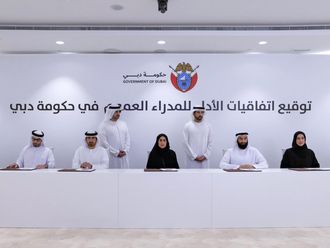Sharjah: Extremism in the Arab region can survive military action and must be countered by effective state communication, a Sharjah conference heard.
State, military and media officials told the International Government Communication Forum [IGFC] on Sunday that groups like Daesh have taken advantage of a communication gap between government officials and the public.
They added that military action could only defeat Daesh and their ilk in the short term as their ideology is spreading to homes and schools, targeting the youth.
An IGFC panel discussion at the Sharjah Expo Centre, which began on Sunday and concludes on Monday, stressed the need for state officials, religious leaders and schoolteachers to counter extremist thought by engaging teens and young adults in a dialogue process.
Daesh has been active on Twitter and video-sharing sites to garner support.
Faisal Al Fayez, first deputy speaker, Jordanian Senate Council, said a counter media and ideological strategy is the need of the hour, together with direct face-to-face interactions between high-ranking officials and ordinary people.
He added that “meet me, don’t feed me” is a common demand subjects want from states in the region.
Also stressing the need to “win hearts and minds” in conflict zones was General Sir Richard Shirreff, former deputy supreme allied commander of Nato Europe. He said “strategic communications need to tell a more compelling story than the adversary. It has to resonate emotionally and intellectually”.
Jose Barroso, former prime minister of Portugal, said it was a “paradox” that “extremist forces” had support in an age characterised by education. He added that it was the vast variety of media at people’s disposal that “have made matters much more complicated”.
The discussion was moderated by BBC Middle East Editor Jeremy Bowen.












